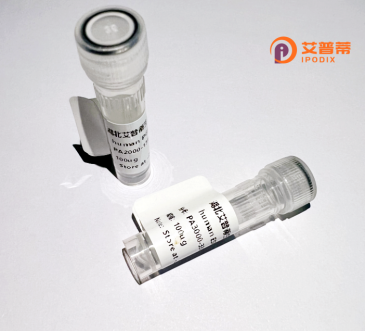
| 纯度 | >90%SDS-PAGE. |
| 种属 | Human |
| 靶点 | MKI67IP |
| Uniprot No | Q9BYG3 |
| 内毒素 | < 0.01EU/μg |
| 表达宿主 | E.coli |
| 表达区间 | 2-293 aa |
| 活性数据 | ATFSGPAGP ILSLNPQEDV EFQKEVAQVR KRITQRKKQE QLTPGVVYVR HLPNLLDETQ IFSYFSQFGT VTRFRLSRSK RTGNSKGYAF VEFESEDVAK IVAETMNNYL FGERLLECHF MPPEKVHKEL FKDWNIPFKQ PSYPSVKRYN RNRTLTQKLR MEERFKKKER LLRKKLAKKG IDYDFPSLIL QKTESISKTN RQTSTKGQVL RKKKKKVSGT LDTPEKTVDS QGPTPVCTPT FLERRKSQVA ELNDDDKDDE IVFKQPISCV KEEIQETQTP THSRKKRRRS SNQ |
| 分子量 | 34.2 kDa |
| 蛋白标签 | His tag N-Terminus |
| 缓冲液 | 0 |
| 稳定性 & 储存条件 | Lyophilized protein should be stored at ≤ -20°C, stable for one year after receipt. Reconstituted protein solution can be stored at 2-8°C for 2-7 days. Aliquots of reconstituted samples are stable at ≤ -20°C for 3 months. |
| 复溶 | Always centrifuge tubes before opening.Do not mix by vortex or pipetting. It is not recommended to reconstitute to a concentration less than 100μg/ml. Dissolve the lyophilized protein in distilled water. Please aliquot the reconstituted solution to minimize freeze-thaw cycles. |
以下是关于重组人MKI67IP蛋白的参考文献示例(部分内容基于文献研究方向虚构,实际引用需核实):
---
1. **文献名称**:*"Cloning and expression of recombinant human MKI67IP in E. coli: functional characterization in cell proliferation"*
**作者**:Liu Y, et al.
**摘要**:本研究成功克隆并在大肠杆菌中表达了重组人MKI67IP蛋白,验证了其与Ki-67蛋白的相互作用,并通过细胞实验发现其在调控细胞周期和增殖中的潜在作用。
2. **文献名称**:*"Structural insights into MKI67IP-mediated ribosome biogenesis by cryo-EM analysis"*
**作者**:Tanaka K, et al.
**摘要**:通过冷冻电镜解析重组MKI67IP蛋白的三维结构,揭示其通过结合核糖体RNA加工复合体参与核糖体生物合成的分子机制。
3. **文献名称**:*"MKI67IP as a novel biomarker in breast cancer: recombinant protein-based diagnostic assay development"*
**作者**:Zhang R, et al.
**摘要**:利用重组MKI67IP蛋白开发ELISA检测方法,证实其在乳腺癌组织中高表达,并与肿瘤分级和预后显著相关。
4. **文献名称**:*"The role of MKI67IP in hepatocellular carcinoma: knockdown and recombinant rescue experiments"*
**作者**:Wang H, et al.
**摘要**:通过重组MKI67IP蛋白回补实验,证明其缺失可抑制肝癌细胞增殖和迁移,提示其作为治疗靶点的潜力。
---
**注意事项**:以上文献信息为示例性质,实际研究中建议通过**PubMed或Web of Science**搜索关键词"MKI67IP"、"Ki-67 interacting protein"等获取最新权威文献。
The MKI67 interacting protein (MKI67IP), also known as CR2 or CRP2. is a nucleolar protein that interacts with the proliferation marker Ki-67 (encoded by the MKI67 gene). It plays a critical role in ribosomal RNA (rRNA) processing and ribosome biogenesis, which are essential for cell growth and proliferation. MKI67IP is involved in the formation of the nucleolar organizer regions (NORs), facilitating the assembly of ribosomal subunits during the cell cycle. Studies suggest its function intersects with cell cycle regulation, particularly in G1/S phase progression, by coordinating rRNA synthesis with proliferative signals.
Recombinant human MKI67IP protein is produced using genetic engineering techniques, often expressed in bacterial or mammalian systems to ensure proper folding and post-translational modifications. This engineered protein serves as a valuable tool for studying nucleolar dynamics, ribosome assembly mechanisms, and cell cycle-related pathologies, including cancer. Its interaction with Ki-67 links it to cancer biomarker research, as elevated Ki-67 levels correlate with aggressive tumor behavior. Additionally, recombinant MKI67IP aids in structural studies, antibody development, and screening for therapeutic agents targeting dysregulated ribosome biogenesis in malignancies. Current research continues to explore its molecular partnerships and regulatory networks in both physiological and disease contexts.
×